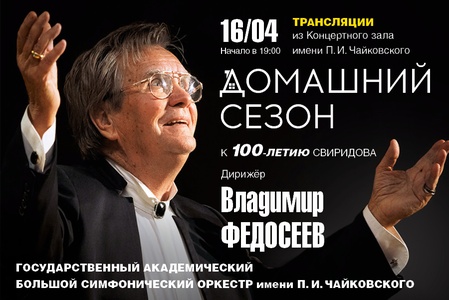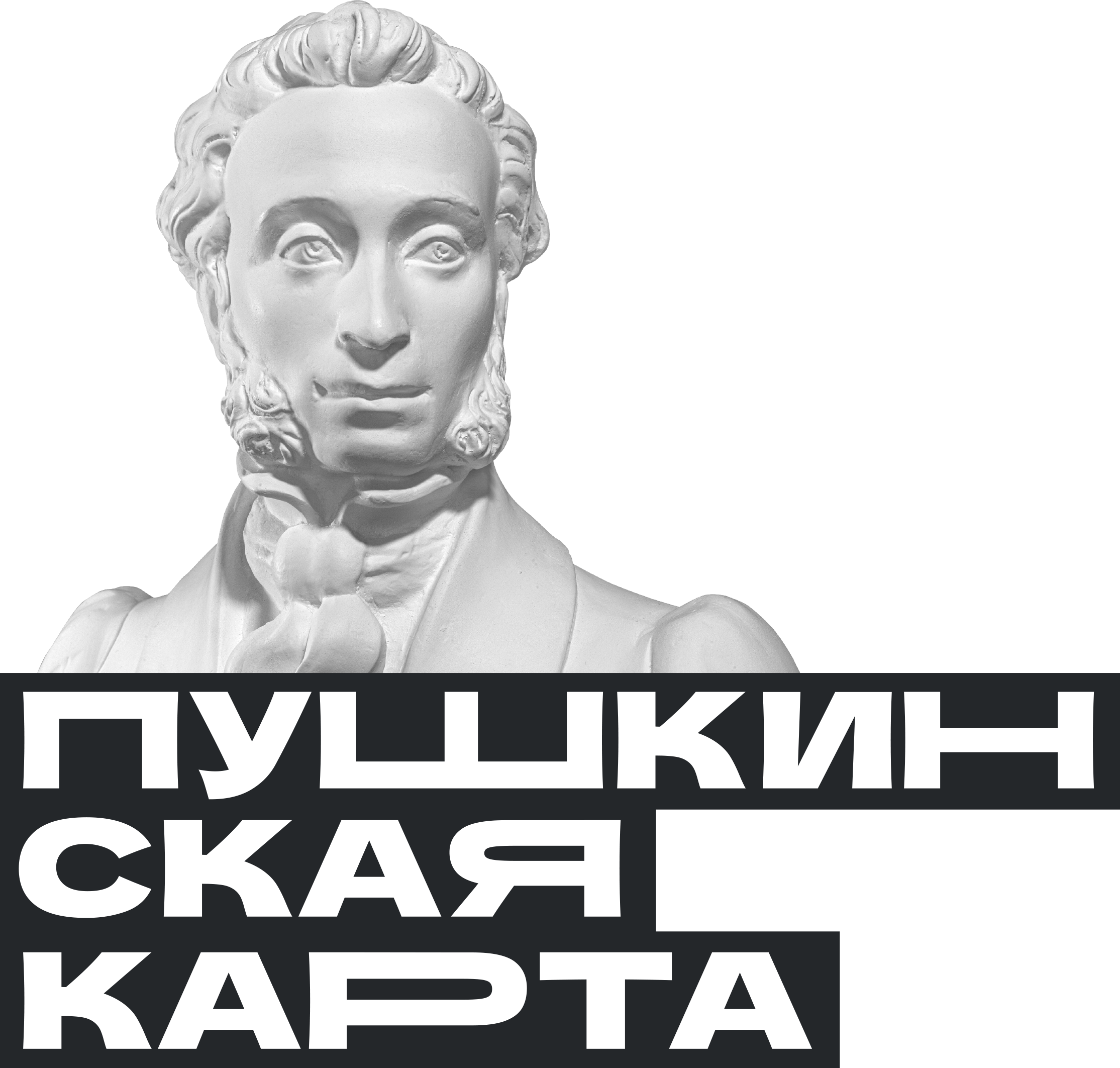Armchair Concerts.
Broadcasts from Tchaikovsky Concert Hall
April 16, 2020
Tchaikovsky Concert Hall
directions to the hallVideo
Get full access to services at your Personal Account page
Personal Account page:
- — exclusive videos
- — browsing history
- — personal playlists
- — mobile app and account sync
Already registered?
Account LoginProgram:
Sviridov
Small Triptych
Musical Illustrations for the novel by A.S.Pushkin's "The Snowstorm"

Tchaikovsky Symphony Orchestra
The Moscow Radio Symphony Orchestra was founded in 1930. Until the dissolution of the Soviet Union, the Orchestra was the official orchestra of the Soviet Radio Network. Alexander Orlov became the Orchestra’s first director in 1930 and is credited with developing a diverse and voluminous repertoire. From 1937 to the present, a series of outstanding directors have contributed to the Orchestra’s distinctive artistic style and personality: Nikolay Golovanov (1937–1953), Alexander Gauk (1953–1961), Gennady Rozhdestvensky (1961–1974). In 1974, Vladimir Fedoseyev assumed leadership, and turned the Orchestra into one of Russia’s most widely acclaimed ensembles.
Over the years, a distinguished group of composers, guest conductors and soloists have played an integral role in the development of the Moscow Radio Symphony Orchestra: Stokowski, Mravinsky, Cluytens, Sebastian, Abendrot, Feitelberg, Zecchi and Sanderling are among the artists who have led the ensemble. Emil Gilels, Yury Bashmet, Victor Tretyakov, Gidon Kremer, Misha Maisky, Oleg Maisenberg, Lisa Leonskaja and more contemporary musicians (among them Maxim Vengerov, Vadim Repin, and Mikhail Pletnev) have supported the Orchestra from the very beginning of their career as musicians. In 1993, the Orchestra was renamed by the decree of the Russian Ministry of Culture and became Tchaikovsky Symphony Orchestra of Moscow Radio. Awarding the Orchestra the name of this great Russian composer was recognition of its role in promoting much of the music written by Tchaikovsky.
The Tchaikovsky Symphony Orchestra traditionally participates in the legendary international Tchaikovsky Competition and also in the musical evenings which take place in the Tchaikovsky museums in Klin and Votkinsk. The Orchestra has given premieres of the new works of such prominent composers as Shostakovich, Khachaturian, Myaskovsky, Prokofiev, Gliere, Sviridov, Boris Tchaikovsky and Gubaidulina. It has also premiered works of the best composers from the former Soviet Union such as Taktakishvili, Toradze, Oganesyan, Melikov, Barkauskas, Tormis and many more. Engagements abroad have included appearances in London, Tokyo, Paris, Milan, Munich, Frankfurt, Geneva, Stockholm, Rome, Oslo, Prague and many other major cities. The Tchaikovsky Symphony Orchestra is the only Russian orchestra consistently invited to open the concert season in the prestigious Golden Hall of the Musikverein in Vienna.
The Tchaikovsky Symphony Orchestra is a frequent participant in numerous festivals; Beethoven Festival in Bonn, Bruckner Festival in Linz, Mozart Festival in Salzburg, Menuhin Festival in Gstaad, Klang Bogen in Vienna, Rachmaninov Festivals in Los Angeles, Carinthian Summer in Villach, Millennium in Athens, Scriabin Festival in Graz, Festival of Modern Music in Paris, Festival of Prokofiev, Russian Modern Music in Germany, Jeunesse Festivals in Vienna, Grieg Festival in Bergen as well as festivals in Hong Kong, Rome, Bregenz, Baden-Baden, Zurich and Edinburgh. In 1990, the Tchaikovsky Symphony Orchestra was the first Russian orchestra to perform at the Salzburg Festival in honour of the Festival’s 70th anniversary.
For more than 40 years, Vladimir Fedoseyev has led the Tchaikovsky Symphony Orchestra in the tradition of his predecessors. His interpretations are famous for their depth, artistic passion and great sensitivity for the national character of Russian music. Maestro Fedoseyev has created in the Orchestra a specific melodious emotional style that distinguishes it from others and has helped it to earn worldwide acclaim. Vladimir Fedoseyev and the Tchaikovsky Symphony Orchestra have recorded extensively for a variety of labels including Ariola, JVC, Musica, Philips, Pony Canyon, Relief Records and Sony Classical.
Vladimir Fedoseyev
Conductor Vladimir Fedoseyev was born in Leningrad on August 5, 1932. He received his musical education at the State Gnessins Music Teachers Institute (now the Russian Gnessins Music Academy) and attended a graduate course at the Moscow Tchaikovsky Conservatory with Professor Leo Ginsburg. He started his conducting career in the Leningrad Philharmonic Orchestra after he was invited by Evgeny Mravinsky. Vladimir Fedoseyev’s theatrical conducting debut also took place in Leningrad, at the State Kirov (Mariinsky) Academic Opera and Ballet Theatre where he staged The Tsar’s Bride by Rimsky-Korsakov. In the 1980s and 1990s, Vladimir Fedoseyev presented concert versions of Tchaikovsky’s Eugene Onegin, Rimsky-Korsakov’s The Snow Maiden and Rachmaninoff’s Aleko at the Salle Pleyel in Paris. He conducted Verdi’s Requiem performed by the World Festival Choir and the outstanding soloists Carol Vaness, Florence Ouivar, Luciano Pavarotti and Roberto Scanduizzi in Oslo, Stockholm and Munich.
In the same period of time, the conductor was involved in opera and ballet productions at some of Europe’s best venues, including Rimsky-Korsakov’s The Tale of Tsar Saltan (1988) and Tchaikovsky’s The Queen of Spades and The Sleeping Beauty (1989) at the Teatro alla Scala in Milan, Bizet’s Carmen (1993), Mussorgsky’s Boris Godunov (1994) and Bartok’s The Miraculous Mandarin (1995) at the Vienna State Opera, Glinka’s A Life for the Tsar (1996), Rubinstein’s The Demon and Verdi’s Attila (1998) at the Opernhaus in Zurich. Today, Fedoseyev continues to collaborate with the best theatres. So, in 2015 and 2016, he conducted the new La Scala productions of Tchaikovsky’s The Nutcracker (choreographed by Nacho Duato) and The Sleeping Beauty (choreographed by Alexei Ratmansky). In January 2017, he conducted the premiere nights of Puccini’s Turandot at the Helicon-Opera in Moscow and then was invited to be the theatre’s musical director.
The name of Vladimir Fedoseyev is associated with many orchestras across the world. He was the first guest conductor of the Tokyo Philharmonic Orchestra since 2000, a guest conductor of the Bavarian Radio Symphony Orchestra of Munich, the Radio France Philharmonic Orchestra of Paris, the Finnish Radio Symphony Orchestra, the Berlin Symphony Orchestra, the Dresden Philharmonic Orchestra, the orchestras of Stuttgart, Essen, Cleveland and Pittsburg. Between 1997 and 2006, Vladimir Fedoseyev was the chief conductor of the Vienna Symphony Orchestra, and that decade was marked with the orchestra’s triumphal tours in the countries of Central Europe, Japan, China and the Philippines, as well as the cycle “Beethoven’s Complete Symphonic Works” which was concluded on the 1st of January 2000 with the performance of the Missa solemnis.
No matter how diverse the conductor’s artistic activities are, the Tchaikovsky Symphony Orchestra holds the central place in the life of Vladimir Fedoseyev who has been its artistic director and chief conductor for more than four decades. During these years the conductor formed a special, recognizable style that brought TSO international fame, performed numerous premieres of contemporary composers’ works constantly extending artistic contacts with Russian and foreign composers, as he did in the beginning of his career with Shostakovich and Sviridov and later on with Krzysztof Penderecki (Poland), Ragnar Soderlind (Norway), Vladimir Rubin and Roman Ledenyov (Russia). Among the first large-scale projects of the conductor and TSO were concert productions and performances of the operas Cavalleria rusticana by Mascagni, Cherevichki by Tchaikovsky, and The Snow Maiden and May Night by Rimsky-Korsakov realized for the radio and sound recording.
Many of Vladimir Fedoseyev’s recordings, including all symphonies by Beethoven, symphonies by Tchaikovsky, Mahler and Taneyev, were bestsellers. The conductor’s discography also features all symphonies by Brahms released by Warner Classics & Jazz, and symphonies by Shostakovich published by Pony Canyon in Japan. Vladimir Fedoseyev is an owner of numerous prizes and awards, including the Silver Award from Japan’s Asahi Broadcasting Corporation (for the programmes with works by Tchaikovsky and Shostakovich), the order “For Services to the Fatherland” of all four degrees, the Order of St Vladimir, the Order of the Venerable Sergius of Radonezh of the First Degree, the Silver Cross of Merit of the Republic of Austria, the Order of the Cross of Honour of the First Degree for services to the Republic of Austria Culture, and the Gold Medal of the International Gustav Mahler Society.
In March 2013, in Prague, the conductor received the Trebbia European Award for creative activities. In 2016, the conductor became an owner of the honorable title “Honoured Music Art Worker” and the prize of the Union State in the field of literature and arts. In 2017, the Mayor of Moscow, Sergei Sobyanin, awarded the maestro with the mark of distinction “For Services to Moscow” for his outstanding contribution to the development of Russian culture and music. In January 2018, Patriarch Kirill of Moscow and All Russia presented to Vladimir Fedoseyev the order of Daniel of Moscow first degree.
Artyom Vargaftik
Radio and TV journalist Artyom Vargaftik was born in 1971 in Moscow. He studied at the Tchaikovsky Moscow State Conservatory’s Academic School of Music and the Gnessin Russian Academy of Music, then completed a postgraduate course at the Moscow Conservatory. He taught cello history at the Gnessin Academy of Music in 1997–2000 and was a trainer of music journalism in 2003–2006.
While still a student, he began working on the radio as a correspondent, presenter, and creator of musical programs. His programs Orchestra Pit and Music Scores Never Burn on the Kultura TV channel brought him a wide recognition. Both projects were awarded with TEFI national television awards in 2003 and 2004, respectively.
From 1994 to 2003, Artyom Vargaftik worked as a music journalist on the Echo of Moscow radio, and since 2003 he has been a columnist for Kultura Radio and Radio of Russia. He has taken part in numerous festivals and concerts in Moscow, St. Petersburg, Yekaterinburg, Nizhniy Novgorod, Novosibirsk, Samara, Saratov, Kazan, and other Russian cities. He has been a regular concert presenter at festivals led by Boris Andrianov, such as Vivacello and Musical Expedition.
In 2007, he began to collaborate with the Moscow Philharmonic Orchestra, and their active collaboration is still ongoing (in the 2021/22 season, Artyom is creating and hosting The Story of a Masterpiece series). Artyom Vargaftik is also a regular host of concert programs at the Moscow International House of Music.


